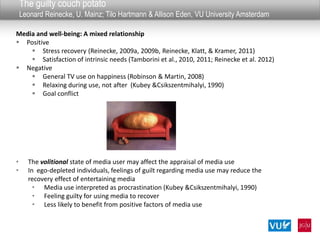Guilty Couch Potato: The role of negative emotions in recovery through media use
- 1. The guilty couch potato Leonard Reinecke, U. Mainz; Tilo Hartmann & Allison Eden, VU University Amsterdam Media and well-being: A mixed relationship  Positive  Stress recovery (Reinecke, 2009a, 2009b, Reinecke, Klatt, & Kramer, 2011)  Satisfaction of intrinsic needs (Tamborini et al., 2010, 2011; Reinecke et al. 2012)  Negative  General TV use on happiness (Robinson & Martin, 2008)  Relaxing during use, not after (Kubey &Csikszentmihalyi, 1990)  Goal conflict • The volitional state of media user may affect the appraisal of media use • In ego-depleted individuals, feelings of guilt regarding media use may reduce the recovery effect of entertaining media • Media use interpreted as procrastination (Kubey &Csikszentmihalyi, 1990) • Feeling guilty for using media to recover • Less likely to benefit from positive factors of media use
- 2. Participants  471 respondents who had 1. worked and 2. played video games (n = 262)or watched TV (n = 209) the day before  Recruited at a German video games website, two universities in Germany and one university in Switzerland  61.8 percent male, Mage= 25.1 years Measures  Ego depletion scale (Ciarocco, Twenge, Muraven, & Tice, 2007; α = .941)  Procrastination (Tuckman, 1991; α = .910)  Guilt (Marschall, Saftner & Tangney, 1994; α = .927)  Recovery (Sonnentag & Fritz, 2007; α = .818)  Vitality (ADACL, Thayer, 1989, α = .912)  Enjoyment (2 items, α = .893) The guilty couch potato Leonard Reinecke, U. Mainz, Tilo Hartmann & Allison Eden, VU University Amsterdam
- 3. Results: Two-Group Path Model TV (n = 209) Ego-Depletion Procrastination Guilt Recovery Experience Enjoyment Vitality .20 .56 -.22-.19 .36 .13.25 Ego-Depletion Procrastination Guilt Recovery Experience Enjoyment Vitality .26 .58 -.21-.11 (ns) .29 .15.15 Video Games (n = 262) χ²(14) = 28.95, p < .05; CMIN/df = 2.07, CFI = .965, RMSEA = .048, SRMR = .053
- 4. The results demonstrate a paradoxical situation:  Ego-depleted individuals have high need for recovery  Are less able to benefit from entertaining media to provide that recovery  Due to negative appraisal of their own behavior Limitations:  Sample structure  Retrospective responses  Cross-sectional data Current studies:  Ego depletion and the selection of emotionally and cognitively challenging media  Long term self-regulation and media selection in new environments  Media use and well-being: An experience sampling method The guilty couch potato Leonard Reinecke, U. Mainz, Tilo Hartmann & Allison Eden, VU University Amsterdam
- 5. Many thanks for your attention! Leonard Reinecke Johannes Gutenberg University of Mainz, Germany Tilo Hartmann & Allison Eden VU University Amsterdam Contact: a.l.eden@vu.nl





